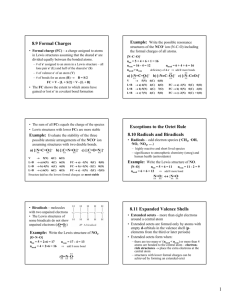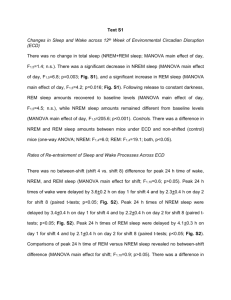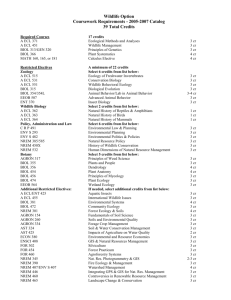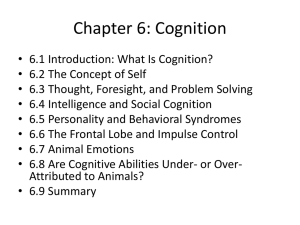natural resources and environmental management
advertisement
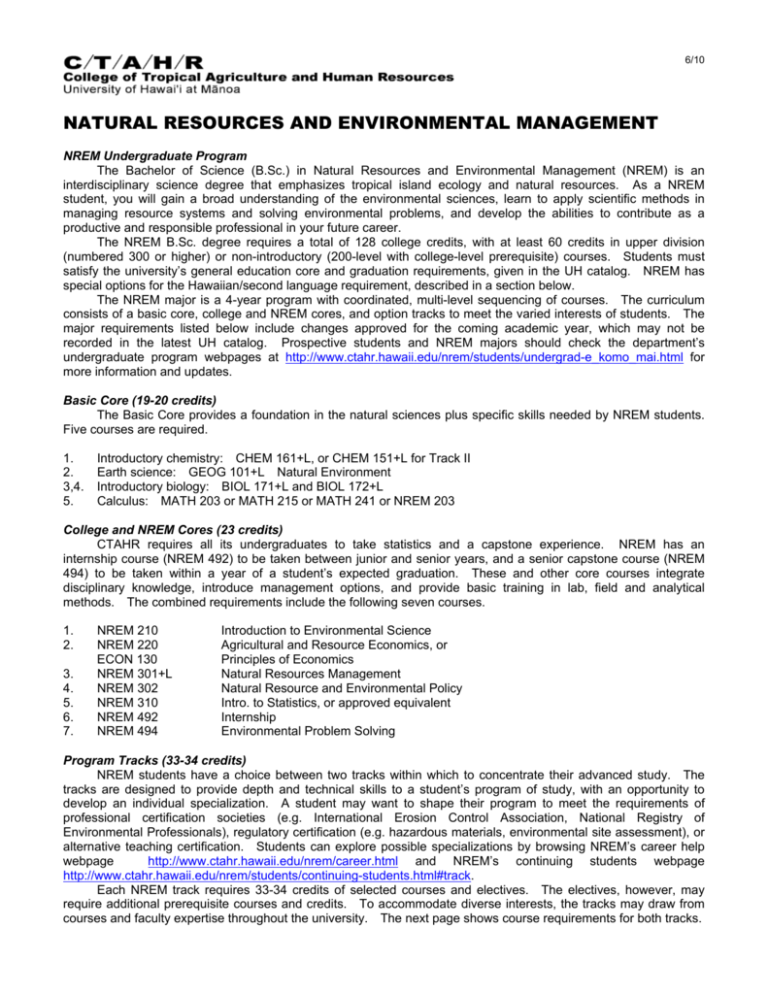
6/10 NATURAL RESOURCES AND ENVIRONMENTAL MANAGEMENT NREM Undergraduate Program The Bachelor of Science (B.Sc.) in Natural Resources and Environmental Management (NREM) is an interdisciplinary science degree that emphasizes tropical island ecology and natural resources. As a NREM student, you will gain a broad understanding of the environmental sciences, learn to apply scientific methods in managing resource systems and solving environmental problems, and develop the abilities to contribute as a productive and responsible professional in your future career. The NREM B.Sc. degree requires a total of 128 college credits, with at least 60 credits in upper division (numbered 300 or higher) or non-introductory (200-level with college-level prerequisite) courses. Students must satisfy the university’s general education core and graduation requirements, given in the UH catalog. NREM has special options for the Hawaiian/second language requirement, described in a section below. The NREM major is a 4-year program with coordinated, multi-level sequencing of courses. The curriculum consists of a basic core, college and NREM cores, and option tracks to meet the varied interests of students. The major requirements listed below include changes approved for the coming academic year, which may not be recorded in the latest UH catalog. Prospective students and NREM majors should check the department’s undergraduate program webpages at http://www.ctahr.hawaii.edu/nrem/students/undergrad-e_komo_mai.html for more information and updates. Basic Core (19-20 credits) The Basic Core provides a foundation in the natural sciences plus specific skills needed by NREM students. Five courses are required. 1. 2. 3,4. 5. Introductory chemistry: CHEM 161+L, or CHEM 151+L for Track II Earth science: GEOG 101+L Natural Environment Introductory biology: BIOL 171+L and BIOL 172+L Calculus: MATH 203 or MATH 215 or MATH 241 or NREM 203 College and NREM Cores (23 credits) CTAHR requires all its undergraduates to take statistics and a capstone experience. NREM has an internship course (NREM 492) to be taken between junior and senior years, and a senior capstone course (NREM 494) to be taken within a year of a student’s expected graduation. These and other core courses integrate disciplinary knowledge, introduce management options, and provide basic training in lab, field and analytical methods. The combined requirements include the following seven courses. 1. 2. 3. 4. 5. 6. 7. NREM 210 NREM 220 ECON 130 NREM 301+L NREM 302 NREM 310 NREM 492 NREM 494 Introduction to Environmental Science Agricultural and Resource Economics, or Principles of Economics Natural Resources Management Natural Resource and Environmental Policy Intro. to Statistics, or approved equivalent Internship Environmental Problem Solving Program Tracks (33-34 credits) NREM students have a choice between two tracks within which to concentrate their advanced study. The tracks are designed to provide depth and technical skills to a student’s program of study, with an opportunity to develop an individual specialization. A student may want to shape their program to meet the requirements of professional certification societies (e.g. International Erosion Control Association, National Registry of Environmental Professionals), regulatory certification (e.g. hazardous materials, environmental site assessment), or alternative teaching certification. Students can explore possible specializations by browsing NREM’s career help webpage http://www.ctahr.hawaii.edu/nrem/career.html and NREM’s continuing students webpage http://www.ctahr.hawaii.edu/nrem/students/continuing-students.html#track. Each NREM track requires 33-34 credits of selected courses and electives. The electives, however, may require additional prerequisite courses and credits. To accommodate diverse interests, the tracks may draw from courses and faculty expertise throughout the university. The next page shows course requirements for both tracks. Track I: Resource Management and Conservation Track I focuses on the biological and physical science aspects of NREM. Required courses and credits include the following. 1. Natural science: CHEM 162+L General Chemistry II, and PHYS 151+L College Physics 2. NREM 304 Fundamentals of Soil Science 3. NREM 477 Geographic Information Systems for Resource Managers 4. Natural resources depth: 18 upper division (300-400 level) credits in a natural resource specialization area. Typically, courses will be selected from the following disciplines: biological sciences, chemistry, geological sciences and hydrology, soil and other agricultural sciences. At least one course should emphasize analytical, lab or field research methods. Course selection requires approval by a NREM adviser. Track I students can design their program to specialize in areas such as forestry, wildlife management, endangered species, plant conservation, soil and water conservation, water resources, water quality, watershed management, coastal management, aquatic systems, biowaste treatment and disposal, remote sensing. Track II: Resource Development and Policy The second track emphasizes the social sciences and business/public management skills. The required courses and credits are given below. 1. Management: one community course and one business-related course selected from FAMR 352 Community Needs & Resources, or NREM 420 Community & Nat. Resource Management and NREM 351 Enterprise Management, or NREM 341 Agribusiness Accounting & Financial Analysis 2. Social science depth: 12 upper division credits (four 3-credit courses) in selected social science disciplines including anthropology, economics, geography, political science, and sociology. At least 9 credits must be in a single discipline. One of the four courses may be from a closely related multidisciplinary social science program like business, planning, or ethnic studies. Course selection requires approval by a NREM adviser. 3. Social science methods: two upper division courses (total 6 credits) including Quantitative analysis: one course (3-4 credits) in policy decision-making selected from NREM 429 Spreadsheet Modeling for Business & Economic Analysis NREM 458 Environmental Benefit Cost Analysis NREM 477 Geographic Information Systems for Resource Managers GEOG 413 Resource Management One upper division course (3 credits) in social science research (analytical or field) methods, or in advanced communication methods/skills (COM, JOUR, or SP alpha). 4. Natural resources: 9 upper division credits in specific resource area(s) or in field study method(s). Possible specialization areas for Track II students include community resource management, ecotourism, agribusiness, natural resource planning, environmental education, environmental policy and regulations, sustainable development. UH Manoa Hawaiian/Second Language Options As part of UHM graduation requirements for Hawaiian/Second Language (HSL), NREM majors will select one of the three options given below. Students should consult with a NREM adviser about their HSL choice. For Options 2-3, additional Social Science and Natural Science courses can be chosen from any 100-200 level UHM course in the respective area. Courses selected under any option may not be used to meet other degree requirements for UHM general education (except focus) or for the NREM major. Option 1. Show proficiency in a HSL at a 202 course level. Native and bilingual speakers of a second language may be granted a waiver for the HSL requirement by the College of Languages, Linguistics and Literature. Option 2. Show proficiency in a HSL at a 102 course level, and take one additional course each in the Social Sciences (3 credits) and in the Natural Sciences (3-4 credits). Option 3. Take two additional courses each in the Social Sciences (total 6 credits) and in the Natural Sciences including at least one course with a laboratory (total 7-8 credits). Admissions and Advising An adequate high school background would include college-preparatory classes in biology, chemistry, and mathematics through trigonometry. The program admits entering freshmen in good standing (i.e., meet all UHM general admission standards). A minimum 2.5 GPA is required for any college transfers into the NREM major. Transfer students from outside UH Manoa need 24 transferable credits. NREM has mandatory advising. An entering student meets with NREM’s undergraduate adviser to assess their preparation for the major, prospective track and specialization area. Based on their interests, a student is assigned to a faculty adviser, who can help them plan courses and monitor progress. Students should review advising information at http://www.ctahr.hawaii.edu/nrem/students/undergrad-e_komo_mai.html for procedures, handouts, links to other UH websites, and tips on completing the degree.
